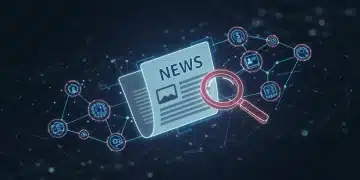Decentralized Fact-Checking: Crypto Journalism vs. Misinformation in the US

Decentralized fact-checking utilizes blockchain technology to combat misinformation in the US, empowering crypto journalism platforms to provide transparent, verifiable information, fostering trust and accountability in reporting.
The rise of misinformation poses a significant threat to informed decision-making, especially within the complex landscape of cryptocurrency. Decentralized fact-checking, increasingly adopted by crypto journalism platforms in the US, offers a novel approach to combatting these issues.
Understanding Decentralized Fact-Checking
Decentralized fact-checking leverages blockchain technology to create a transparent and immutable record of factual information. This approach aims to enhance the credibility of news and combat the spread of misinformation, particularly within the crypto space.
Traditional fact-checking often relies on centralized authorities, which can be perceived as biased or opaque. Decentralized systems, on the other hand, distribute the responsibility of verifying information across a network of participants, promoting a more democratic and trustworthy process.
Key Principles of Decentralized Fact-Checking
Decentralized fact-checking operates on several core principles that distinguish it from traditional methodologies. These principles ensure greater transparency, accountability, and resilience against manipulation.
- Transparency: All fact-checking processes and outcomes are recorded on a public ledger, making them accessible to anyone.
- Immutability: Blockchain technology ensures that verified information cannot be altered or deleted, providing a permanent record.
- Decentralization: Fact-checking responsibilities are distributed across multiple participants, reducing reliance on single entities.
- Incentivization: Participants are often incentivized through tokens or rewards for accurately verifying information.
By adhering to these principles, decentralized fact-checking aims to create a more reliable and trustworthy information ecosystem for the crypto community in the US.
In conclusion, decentralized fact-checking offers a promising solution to enhance the credibility of information, fostering a more informed and trustworthy environment for crypto journalism in the US.
The Role of Crypto Journalism Platforms
Crypto journalism platforms play a vital role in disseminating accurate information about the cryptocurrency industry. These platforms are increasingly adopting decentralized fact-checking mechanisms to enhance their credibility and combat the spread of misinformation.
By embracing decentralized approaches, crypto journalism platforms aim to build trust with their audience and establish themselves as reliable sources of information in a rapidly evolving landscape.

Benefits of Decentralized Fact-Checking for Crypto Journalism
The integration of decentralized fact-checking offers several key advantages for crypto journalism platforms operating in the US. These benefits contribute to increased transparency, accuracy, and user engagement.
- Enhanced Credibility: Transparent fact-checking processes build trust with readers and establish the platform as a reliable source.
- Improved Accuracy: Decentralized verification reduces the risk of biased or inaccurate reporting.
- Increased User Engagement: Community participation in fact-checking fosters a sense of ownership and engagement.
These advantages help crypto journalism platforms stand out in a crowded market and attract a loyal audience seeking trustworthy information.
Ultimately, crypto journalism platforms are vital in providing reliable information, and decentralized fact-checking helps them build trust and accuracy within the crypto-community.
Combating Misinformation in the US Crypto Market
The US crypto market is particularly vulnerable to misinformation due to its rapid growth and speculative nature. Decentralized fact-checking offers a powerful tool to combat the spread of false or misleading information and protect investors.
By utilizing decentralized systems, crypto journalism platforms can help filter out noise and provide readers with accurate insights, empowering them to make informed decisions.
Challenges in Combating Crypto Misinformation
Addressing misinformation in the crypto market presents several unique challenges. These challenges stem from the complexity of the technology, the lack of regulatory oversight, and the prevalence of scams and fraudulent schemes.
- Technical Complexity: Cryptocurrencies and blockchain technology can be difficult for the average person to understand, making it easier for misinformation to spread.
- Limited Regulation: The lack of clear regulatory frameworks allows scams and misinformation to thrive.
- Rapid Market Changes: The fast-paced nature of the crypto market makes it challenging to keep up with emerging trends and potential risks.
- Social Media Influence: Misleading information can quickly spread through social media channels, reaching a large audience before it can be debunked.
Overcoming these challenges requires a multi-faceted approach that combines technological solutions, journalistic integrity, and community engagement.
In sum, combating misinformation requires efforts from journalists, technologists, and the crypto-community to ensure reliable information.
Examples of Decentralized Fact-Checking Platforms
Several innovative platforms are pioneering the use of decentralized fact-checking in the US. These platforms offer unique approaches to verifying information and rewarding accurate reporting.
By examining these examples, we can gain a better understanding of the potential and limitations of decentralized fact-checking in the context of crypto journalism.

Notable Platforms
Here are some examples of platforms that are incorporating decentralized fact-checking:
- Fact Protocol: Rewards users for accurate reporting and penalizes the spread of misinformation by using game theory.
- Civil: Aims to create a decentralized news ecosystem where journalists and readers can collaborate to verify information.
- Reality Keys: Fact checking based on prediction markets.
Each platform employs different mechanisms to achieve its goals, but they all share a commitment to transparency, accuracy, and community participation.
These are but a few examples of how platforms are innovating in the space, and paving the way towards trustworthy journalism.
The Impact on Trust and Accountability
Decentralized fact-checking has the potential to significantly enhance trust and accountability within the crypto journalism ecosystem in the US. By providing transparent and verifiable information, these systems can help restore confidence in news sources and combat cynicism.
Increased trust and accountability can lead to greater investment, adoption, and overall growth of the crypto market.
Building a More Trustworthy Ecosystem
To build a more trustworthy ecosystem, we must continue to develop and refine decentralized fact-checking mechanisms, promote media literacy, and encourage responsible reporting.
Efforts in promoting transparency and accountability in the crypto world:
- Promoting Transparency: Encouraging crypto news outlets to disclose ownership and funding sources.
- Fostering Media Literacy: Educating the public on how to critically evaluate information and identify misinformation.
- Rewarding Ethical Reporting: Recognizing and supporting journalists who adhere to high standards of accuracy and fairness.
By working together, we can create a more informed and resilient crypto community in the US.
Ultimately, these combined factors play a large part in improving trust and accountability.
The Future of Fact-Checking in Crypto Journalism
The future of fact-checking in crypto journalism is likely to be increasingly decentralized, automated, and community-driven. As technology evolves and new platforms emerge, we can expect to see even more innovative approaches to verifying information and combating misinformation.
New tech and automation will play a huge part of fact-checking in the future.
Emerging Trends
Several emerging trends are poised to shape the future of decentralized fact-checking in the crypto space.
- AI-Powered Fact-Checking: Artificial intelligence can automate the process of identifying and verifying information, improving speed and scalability.
- Reputation Systems: Blockchain-based reputation systems can track the accuracy and reliability of journalists and news sources.
- Decentralized Autonomous Organizations (DAOs): DAOs can be used to govern fact-checking platforms and ensure community oversight.
These trends could transform how we gather, share, and verify information in the crypto world.
In conclusion, the next few years will prove very useful as more fact-checking innovation comes out.
| Key Point | Brief Description |
|---|---|
| 🛡️ Decentralized Fact-Checking | Utilizes blockchain for transparent information verification. |
| 📰 Crypto Journalism | Platforms adopting decentralized fact-checking to build trust. |
| 🚫 Combating Misinformation | Reduces the spread of false information in the US crypto market. |
| 🤖 Future Trends | AI, reputation systems, and DAOs shaping fact-checking. |
FAQ
▼
Decentralized fact-checking uses blockchain technology to verify information transparently. It distributes the responsibility of verifying facts across a network, making it more reliable than traditional methods.
▼
It enhances credibility and combats misinformation, which is rampant in the crypto market. By using decentralized methods, journalism platforms can build trust with their audience.
▼
Blockchain provides an immutable record of verified information. Once a fact is checked and recorded, it cannot be altered, ensuring the information’s integrity and long-term reliability.
▼
The technical complexity of cryptocurrencies, limited regulation, rapid market changes, and the influence of social media make it difficult to combat misinformation effectively in the crypto space.
▼
Emerging trends are AI-powered fact-checking, blockchain-based reputation systems, and DAOs (Decentralized Autonomous Organizations) managing fact-checking platforms, enhancing automation and community oversight.
Conclusion
In conclusion, decentralized fact-checking represents a significant step forward in the fight against misinformation within the crypto industry in the US. By empowering crypto journalism platforms with transparent, verifiable tools, we can foster a more informed and trustworthy ecosystem for investors and enthusiasts alike.





